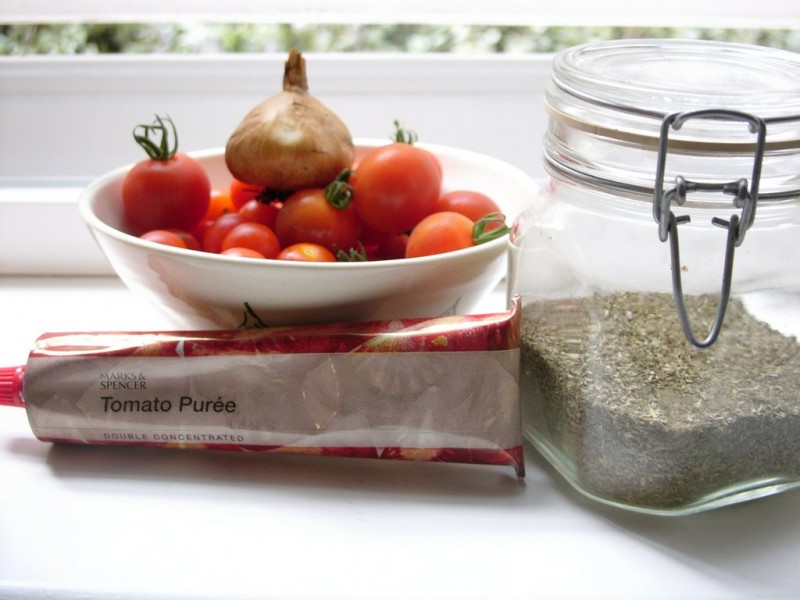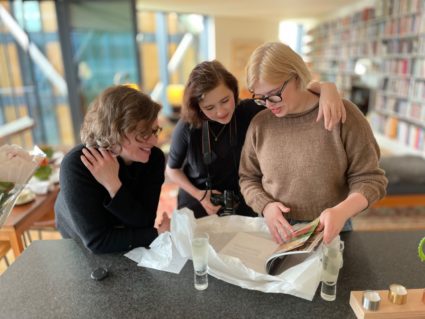set yourself a challenge, why don’t you

Well. Remember how I was going on and on about how good my French was? How proud I was to be able to get along without anyone trying to speak English to me, how cool it was to get new shoes for Avery entirely in French? Even prouder was I to wander into a French cookbook store, the Librairie Gourmande and express my desire for a cookbook that was a sort of memoire, a cookery writer’s reminiscences, a sort of personal history of food. Just like, in fact, the sort of cookbook I am currently trying to write. As much personal memories as recipes. You know the kind of thing. Oh boy did I ever pat myself on the back when the nice proprietress put her head on one side like a little French sparrow, lead me to a shelf, and handed me exactly, precisement what I was looking for. “A la table d’un ecrivain: petit traite romanesque de cuisine,” by Marie Rouanet. Translated: “From the table of a writer: a little romanesque treatise on cuisine.” Isn’t that exactly what I was looking for?
It’s much too hard.
I haven’t worked this hard since 1992. I have enlevee my massive Cassell’s French Dictionary from a high, high shelf and I am madly sifting through trying to make head or tail of what this nice lady is saying to me. It is absolutely wonderful, though, when I manage to figure out a paragraph. English is so literal! At least the English I read, and speak, and write. I don’t have a poetic bone in my body. But I had forgotten that French is almost entirely (when spoken by French people) metaphorical, and absolutely must mean several things, possibly contradictory, at once. Take even the word cuisine itself. To start with, it is both a noun and a conjugated verb, and even more than one of each! A cuisine is literally a kitchen, the room in your house, but it’s also a certain type of cooking, as in “French cuisine.” And the verb is much more expressive than just “to cook.” The boring verb for that is “cuire,” which is sort of like “to make cooked,” like a bald instruction to “make not raw anymore.” Cuisiner is poetry, it is to create, to transform, to render something not just “not raw,” but lovingly lifted up and served. It’s just a wonderful word.
“That cuisine might be love itself and only interesting when it is refined love, that notion of ‘tell me how you eat, how you cook, and I will tell you how you love,’ seems to me to be simple evidence; I read the proof of it in the pages of my cookbooks, those great books with their pages gnawed, dog-eared, stained with fat or sugar, at times torn out but minutely saved, companions of the art of cooking. In them one finds everything. They are swollen over the course of the years with recipes clipped from magazines, or copied out by hand, or noted down as dictated by a friend… And the vocabulary in these books is stunningly lover-like. There is no question but to simmer, to flame, to truss, to serve, to sing, to pare, to let rest, to burst, to stuff, to dress, to blanche, to lay out, to knead, to seize, to pluck, to mix. These are the words of passion, right up to that muslin bag for the bouquet garni, light as a marriage veil, fragrant and lined with white cotton.”
Well, that’s just lovely! But it took me nearly half an hour to figure out what the hell she was saying. I wonder if there would be an English or American market for Rouanet’s books, and if so, if I could get the job of translating them? Who am I kidding, I’d be on my death bed before I got to Chapter Four. Ah, well, I can dream. But truly, everything she says rings true to me. I do think of everything I cook being a sort of offering. I know that sounds ridiculous, but it makes the annoying bits worthwhile; if as you scrub out the skillet from your tomato sauce you can imagine the moment when your beloved family will tuck into their lasagne, coming home to dinner after storm and peril in the business world and the riding stable, it makes those dishpan hands just a little more acceptable. I felt so good when the homemade chicken soup I made for my friend Jill was deemed to be “so terribly terribly welcome, and so good.” It’s enormously important, I think, to run the risk of being thought awfully presumptuous, to turn up with a container of unasked-for food, feeling slightly shy and silly, in order to have it comfort a new mother in between feedings, in the middle of night when she’s all by herself and feeling possibly slightly panicked and neglected.
So I’m going to try to wade through these two books I bought, dictionary at the ready, and if I come upon any more gems, I’ll pass them along. In the meantime, I’ll continue to taste-test among the seemingly endless varieties of tiny tomatoes at Marks and Spencer, and force my child to eat “just one more bite” of pear to see if she prefers Commerce to Red William, and convince ourselves that guinea fowl tastes any different from your run-of-the-mill chicken. And there’s always a skillet waiting to be scrubbed.



